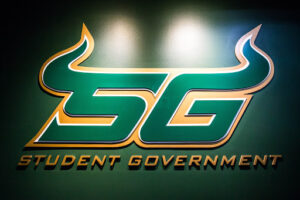Free Immigration Legal Aid initiative now offered monthly to students

Student Government’s (SG) Free Immigration Legal Aid (FILA) initiative provides students with the opportunity to speak with a licensed immigration attorney to find the best course of action for navigating individual immigration concerns.
The new program had its first session Friday and was hosted by SG Solicitor General Natalie Vlckova. She said common examples of problems international students face include the procedures for seeking work or student visas and general inquiries about the naturalization process.
Student Body President Julia Cunningham said SG’s priority is to provide international students on campus with legal support in an attempt to help mitigate stress associated with the immigration process.
“The legal aid program is a way for students to connect with attorneys in the area and ask them questions about immigration or getting involved in the legal field,” Cunningham said.
As it currently stands, FILA sessions will be conducted on a monthly basis over Microsoft Teams, exact dates have yet to be determined. To attend a session, SG’s Legal Aid webpage recommends students preregister on BullsConnect.
Students looking to attend a session don’t have to meet any financial or case specific requirements to qualify, and only 25 slots are available per session. Vlckova said the smaller meeting size is intended to promote a greater amount of dialogue among students and the attorney that would not be present if the session were otherwise packed.
There are over 5,000 international students from more than 145 countries on the Tampa campus, and many are on an F-1 academic visa, according to USF’s Office of International Admissions website.
As the most common type of student visa, F-1 requires a student to have a valid educational purpose for attending college in the U.S., in which the student is required to provide proof of their ability to fund their education as well as proof of full-time course enrollment.
As evidenced by the requirements for acquiring an F-1 visa, the extensive nature of the benchmarks international students must meet to qualify for studying in the U.S. may cause confusion for students that are not well-versed in the process.
To minimize such concerns, Vlckova said the objective of the FILA initiative is to provide a safe environment where international students can have the ability to discuss their questions and concerns in a public forum format with the aid of the attorney assigned to the session.
“It was my intention to make the session [informal],” Vlckova said. “I didn’t want it to be scary sitting with an attorney where maybe it is not something that the students have experience with.”
“I wanted to make it as friendly as possible … and open up the floor to ask questions and not be nervous about it.”
In addition to navigating concerns students may hold about the immigration process, those in SG coordinating the FILA initiative also seek to remove the financial barrier that would otherwise be present with private immigration legal counsel.
Prospective students to the program may be deterred by an expectation of having to pay for the initiative’s legal services, however, Vlckova said the sessions are free for students.
Juana Segura, a USF student that attended the legal aid session, said SG’s provision of free legal aid alleviates the financial concerns most international students experience when undergoing the immigration process.
“Most of us international students are not able to afford an immigration lawyer,” he said. “This type of help … is very helpful to give us ideas of what we can do or who we can contact.
“Though it was not an in-depth session where we could ask about the specific details about our cases, I left with an idea of what I can do, as well as a reliable attorney that I will keep in mind in the future.”
Cunningham said there is still potential to better future sessions in terms of expanding the expertise and experience of the attorneys presiding over the session.
“We would like to diversify the attorneys that we bring in and maybe hold some more sessions,” she said.
“It would be interesting to talk to attorneys from different parts of Florida and from different legal fields. But I think that for now this is a really great program. It can definitely benefit a large majority of our student population.”
As the demand among international students has been high for greater provisions of assistance from SG, Vlckova said she views the program as a service that can help provide necessary assistance to both current and prospective international students undergoing the immigration process.
With the SG election process nearing later this month into early March, the FILA initiative could potentially be done away with or challenged by the incoming SG administration depending on the intended objectives for their term.
“With each administration, they have the option to continue these initiatives or let them go,” Cunningham said. “My hope is that the president elected after me will recognize the benefit that the immigration legal aid initiative brings to our student body.”







